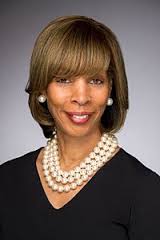State Sen. the Democratic nominee for Baltimore mayor, says she wants the General Assembly to strengthen a law that allows civilians to serve on panels that hear cases against police officers accused of misconduct.
The law, which takes effect Oct. 1, allows civilians to join the internal police trial boards for the first time, if police unions agree.
Supporters of the law say including civilians is necessary to hold officers accountable for misconduct. But some unions are resisting.
In next year’s General Assembly session, Pugh said, she plans to push for legislation that would allow civilians to serve on a trial board without the approval of the local lodge of the Fraternal Order of Police.
Gene Ryan, president of the Baltimore Lodge of the Fraternal Order of Police, said the union is against allowing civilians on the trial board here.
“They don’t know what we do in our profession,” Ryan said. “How can they sit in judgment of us? Would you want me sitting on a medical malpractice board when I don’t know what a doctor does?
Pugh’s two opponents for mayor — Republican Alan Walden and Green Party candidate Joshua Harris — agreed at the forum that there should be more civilian involvement in police disciplinary actions.
“Civilian involvement makes a good deal of sense, providing it does not overwhelm the agency,” Walden said.
Harris said he’d like to see civilians involved in several aspects of the Police Department, including hiring and training.
“We need to put the community at the center of police,” he said.
Democrats in the city outnumber Republicans 10-1 and Greens nearly 300-1. The general election is Nov. 8.
Baltimore’s labor agreement with police has expired. The city’s police union is negotiating with the administration of outgoing Mayor Stephanie Rawlings-Blake.
The sides have agreed not to discuss the negotiations in public.
Trial boards, composed now of three police officers, act as an internal court system for officers accused of wrongdoing. A trial board can recommend an officer be fired, suspended or docked leave, but the police commissioner has final say.
Civilians have been prohibited from serving on the panels under the state Law Enforcement Officers’ Bill of Rights
But the General Assembly approved legislation this year — pushed by Pugh, among others — that allows local governments to add specially trained civilians to the trial boards, subject to the agreement of police unions in certain jurisdictions, including Baltimore. Up to two civilians with full voting rights may be added to the trial boards.
Across the country, civilians have been given a greater role in reviewing alleged police misconduct. Washington, Chicago and Detroit all give civilians authority in disciplining officers.
twitter.com/lukebroadwater


